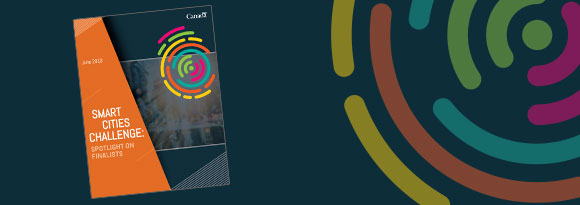Cree Nation of Eastmain, Quebec
This page has been archived on the Web
Information identified as archived is provided for reference, research or recordkeeping purposes. It is not subject to the Government of Canada Web Standards and has not been altered or updated since it was archived.
The first round of the Smart Cities Challenge is closed. The Government of Canada announced the four winners (City of Montréal, Québec; Nunavut Communities, Nunavut; City of Guelph and County of Wellington, Ontario; and Town of Bridgewater, Nova Scotia) on May 14, 2019.

Executive Summary
- PDF Version (186.77 KB)
- HTML Version
"The NZE program is designed to encourage capacity building and a sense of community. By fostering a sense of pride in the community and Cree culture, our NZE program will become a model for Indigenous communities across Canada."
– Final proposal
Challenge Statement
"IMPROVING COMMUNITY WELL-BEING"
Our community will develop an affordable Net Zero Energy Housing Program, offering culturally appropriate designs, using smart technologies, innovative building techniques and alternative energy systems in order to address the housing shortage crisis, the poor-quality and costly construction of houses in Eastmain and Indigenous communities across Canada.
Summary
As our Challenge Statement says, the Cree Nation of Eastmain (CNE) is committed to improving the quality of life and the well-being of its members. As a remote Indigenous community, CNE, like other Indigenous communities across Canada, is faced with a critical housing shortage, compounded by poor quality and costly construction.
Housing is inarguably the foundation of a strong, healthy community without which communities struggle with various social, environmental and health issues. Through local consultations, CNE has determined that high construction costs combined with the high costs of home operation and maintenance, the result of inappropriate construction materials and techniques, are significant barriers to homeownership in Eastmain.
Smart technologies, sustainable building practices and alternative energy systems are the cornerstone of CNE's plan to develop, in collaboration with public and private sector stakeholders, an affordable, culturally-appropriate Net Zero Energy (NZE) housing program, for new and existing housing, to respond to its housing crisis. The NZE program is designed to encourage openness, transparency and transferability.
Through capacity-building, job creation and encouraging community participation, our NZE program will foster prosperity and a sense of pride in the community and in the culture, becoming a model for Indigenous communities across Canada.

Spotlight on Finalists:
Cree Nation of Eastmain, Quebec
Population: 866
Focus Areas:


Prize Category:

#smartcitiesCanada
The Jury's Perspective
Read the transcript
My name is Kourosh Rad. I'm an urban planner from Halifax, Nova Scotia.
It's very exciting to be part of an open and transparent challenge that will result in using the technology to improve the everyday life of the communities and community members. It's exciting to see so many communities coming forward with all kinds of different ideas and innovations that is well-founded within their communities. I was very interested to be part of the jury to discuss these applications and both learn from them and also help them shape the future of the final application.
The Cree of Eastmain, while they're a very small community, they have recognized that the issue of getting energy to a small community is not just about getting the resources there, but also tackling the issue of energy usage itself. They're looking at improving the life of their community members by building Net Zero buildings that will reduce use of energy. At the same time, they have recognized that it's important to monitor what they would do with the Net Zero developments that they're providing for the community and the data that's coming out of it would help them build a case for better, more sustainable building solutions that will tackle the issue of energy use, and not just look at the energy from a supply management perspective.
The Finalist's Perspective
Read the transcript
The Smart Cities Challenge is a competition that calls on Canadian communities to explore how data and connected technology can achieve meaningful outcomes for residents.
The Finalists - $5M Category: Cree Nation of Eastmain, Quebec
Question: Tell us about your team and your community.
Stanley Gilpin (Housing Director): Our community is one of the small communities within the Cree Nation of James Bay. It's a little over about 850.
Mark Tivnan (Director General): Our Smart Cities Challenge team has brought together academia, the private and public sector experts across Canada.
Question: Why did you enter the Challenge?
Mark Tivnan (Director General): We entered the Smart Cities Challenge not just for the challenge itself but also to challenge ourselves. We found the program criteria was in line, what we need to ensure a very structured approach to solve a major community issue that we have, which is housing and the experiences people have related to housing in the community.
William Semple (Architect, NORDEC Consulting and Design): It's a tremendous challenge to bring innovation to the North. It's a tremendous challenge to improve efficiency is the buildings. It's a tremendous challenge to address cost and all of these things and what was fascinating about this project in our discussions was how we're trying to bring all these different parts together. There's a need across the North to see some successful projects and there's a need to see some innovation.
Challenge Statement: "IMPROVING COMMUNITY WELL BEING" Our community will develop an affordable Net Zero Energy Housing Program, offering culturally appropriate designs, using smart technologies, innovative building techniques and alternative energy systems in order to address the housing shortage crisis, the poor quality and costly construction of houses in Eastmain and Indigenous communities across Canada.
Join the conversation: #smartcitiesCanada
Infrastructure Canada
- Date modified: